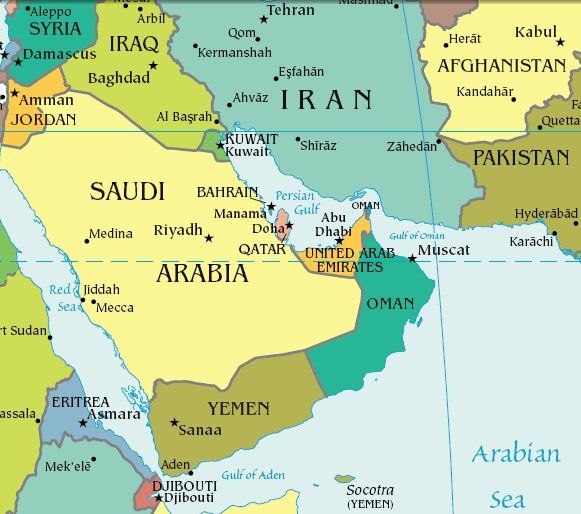International Relations
Saudi-Aramco Drone Attack
- 18 Sep 2019
- 7 min read
The twin drone attacks on Aramco crude oil production in Saudi Arabia have caused the biggest-ever disruption in global crude oil supplies and has further escalated tensions in the Persian Gulf.
- Yemen's Shia Houthi rebels, who have been locked in a war with a Saudi-UAE-led coalition since 2015, claimed responsibility for the attacks.
The Extent of the Oil Price Shock
- Saudi Arabia supplies 10% of the global world oil and is the world’s largest crude oil exporter.
- Crude oil prices have already shot up by over 10 %and oil prices are likely to trend around the $75 per barrel mark in the coming months.
- Assuming that this attack is not the start of international hostilities between a US-led bloc (including Saudi Arabia) and an Iran-led bloc (including the Houthis), the price shock could be relatively limited.
- The world has enough inventories to tide over the immediate shortfall.
Global Impact
- The attack, executed by drones, has not only suspended the production of almost 6 million barrels per day (about 6% of global oil supply) but also has cut output by 5.7 million barrels per day.
- The attack added to anxiety about the stability of the world’s oil reserves.
- The attack would be the adding of a geopolitical tensions premium to the price of oil worldwide.
- Oil prices would rise because of worries about more unrest hurting supply. Subsequently, higher oil prices tend to hurt the economy as consumer costs rise.
- Even if the plants go back online; prices may move higher and stay higher because traders would build in a “security premium” to shield volatility in oil prices considering West Asian unrest.
- The discovery of oil reserves in the USA made it less reliant on oil from the middle east which helped to prevent a situation of “World Oil crunch” which would have been otherwise.
Impact on India
- India imports 80% of the oil it consumes, which means there are multiple ways in which the country will be impacted by this disruption.
- India is already trying to make up for the loss of supply from Iran after US-imposed sanctions.
- Saudi Arabia is India’s second-largest supplier of crude oil — it accounts for almost 17% of the country’s imports.
- If the process of restoration takes more time than anticipated then India may face a crisis as global supply has been fairly volatile because of disruptions in some of the other big suppliers such as Venezuela, Libya, and Nigeria.
- As the dollar prices of crude oil rise, India would need to buy more dollars for the same amount of oil, thus depreciating the value of the rupee vis-à-vis the dollar.
- As a resulting rise in oil prices may worsen the Indian government’s fiscal balance.
- Moreover, higher crude oil prices would also lead to higher domestic oil prices, which, in turn, will further depress the demand for all things, which subsequently would lower economic activity and may lower revenues for the government.
Drone Attacks
- With growing animosity between Iran and Saudi Arabia, besides having a war-torn Yemen in the neighbourhood, the Gulf, which has been far from being peaceful, faces a new challenge in the form of drone attacks.
- With the rapid proliferation of drone technology and exponential growth of its global market in recent years, the possibility of a drone attack cannot be ruled out even in the safest cities in the world.
- Drones are becoming security threats particularly in conflict zones where non-state actors are active and have easy access to the technology.
- The primary reason for this proliferation is that drones are relatively cheaper in comparison to conventional weapons and yet can achieve far more destructive results.
- The biggest advantage that comes with using a drone for combat purpose is that it can be controlled from a remote distance and does not endanger any member of the attacking side.
- It is this easy-to-procure, easy-to-operate, and proven damage potential that makes it important for any country to equip its forces with anti-drone combat technology.
- These threats aside, what makes combat drones in the hands of non-state actors most dangerous is the threat of them being used deliver weapons of mass destruction.
Background
- Since 2014, Yemen is facing a multi-sided conflict involving local, regional, and international actors.
- The Houthis, a group of Zaidi Shia Muslims who ruled a kingdom there for nearly 1,000 years used widespread anger against President Hadi's decision to postpone long-awaited elections and his stalled negotiations over a new constitution to protest against the government.
- They marched from their stronghold of Saada province to the capital Sanaa and surrounded the presidential palace, placing Hadi under house arrest.
- A military coalition led by Saudi Arabia intervened in Yemen on March 26, 2015, at Hadi's request, after the Houthis continued to sweep the south and threatened to conquer the last government stronghold of Aden. Prompting one of the world's worst humanitarian crises ever.







